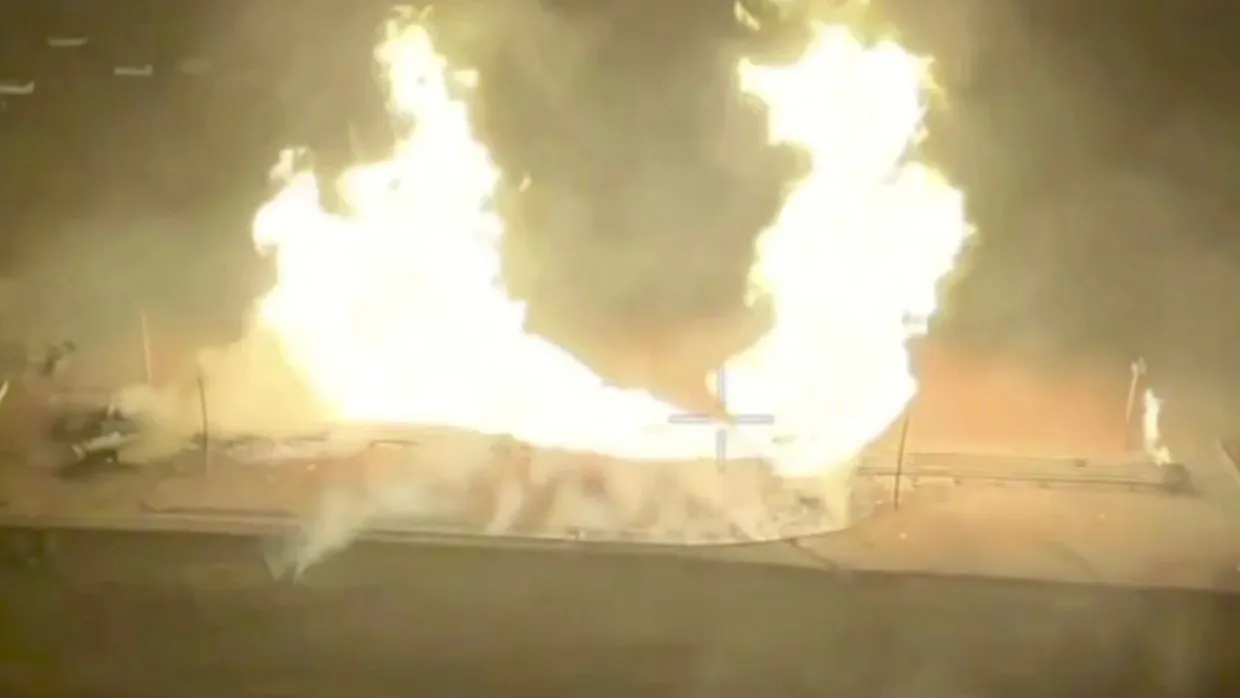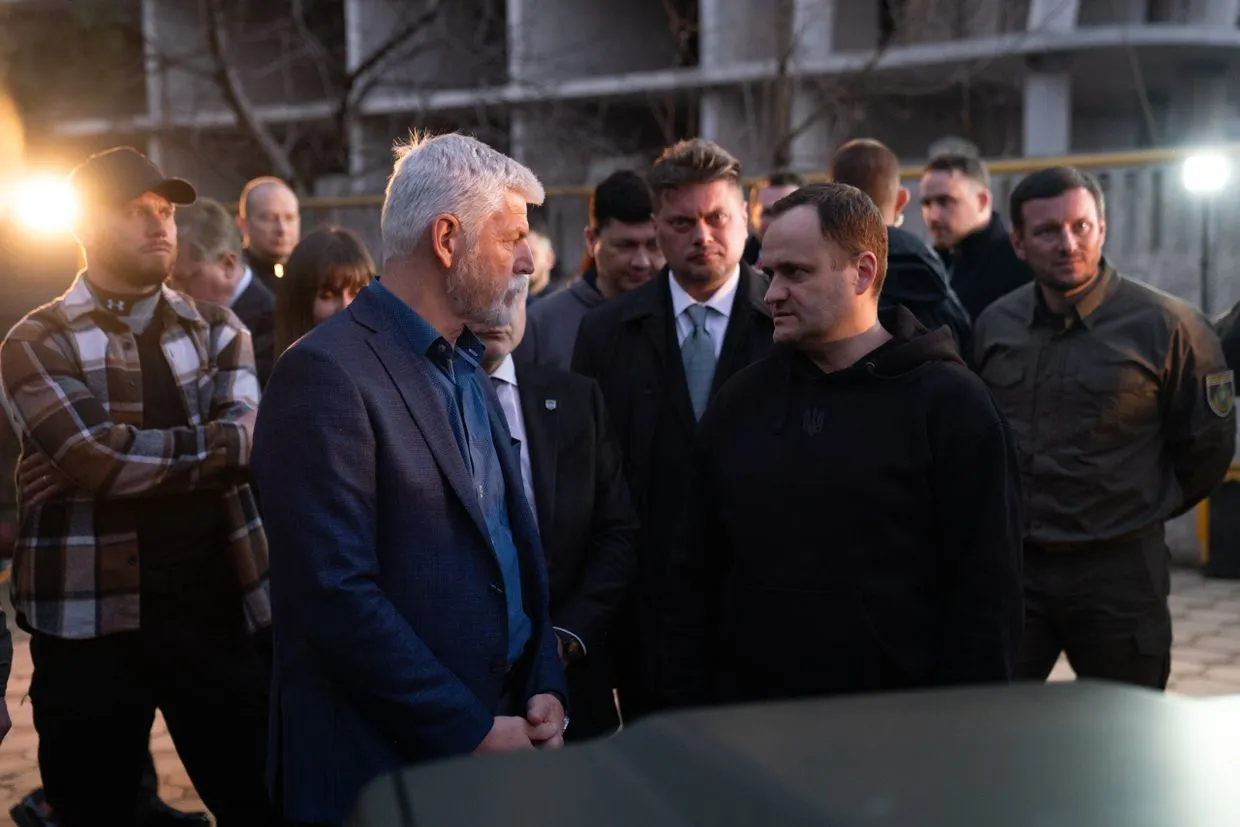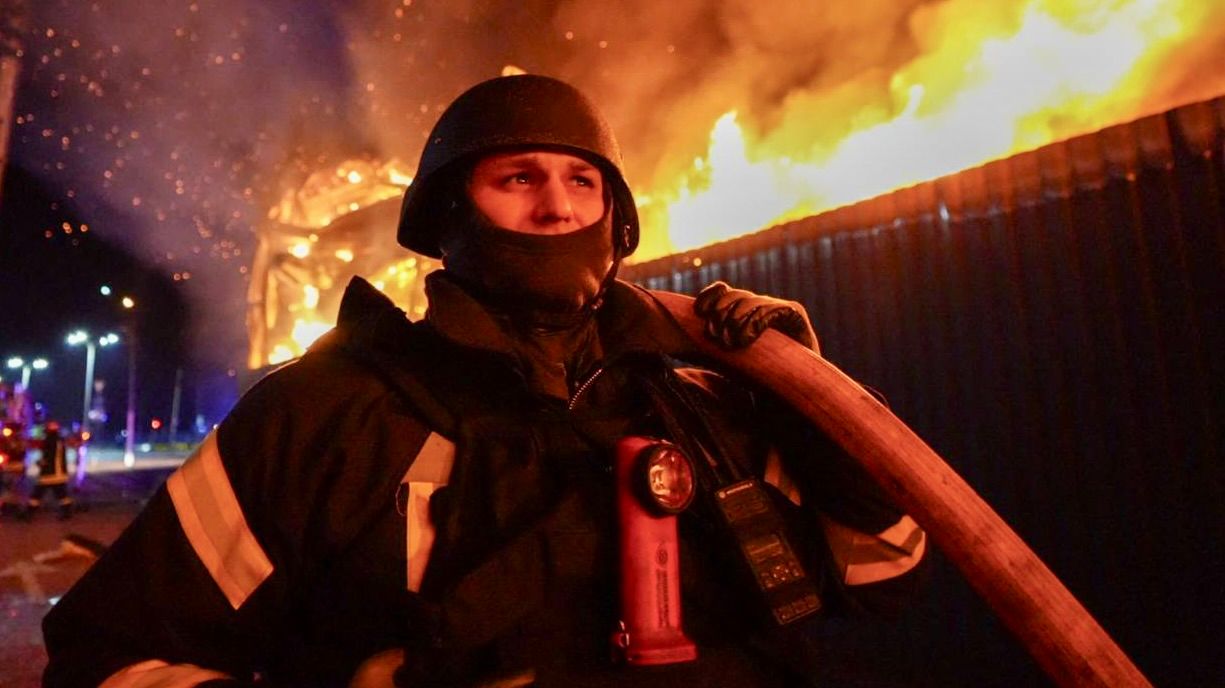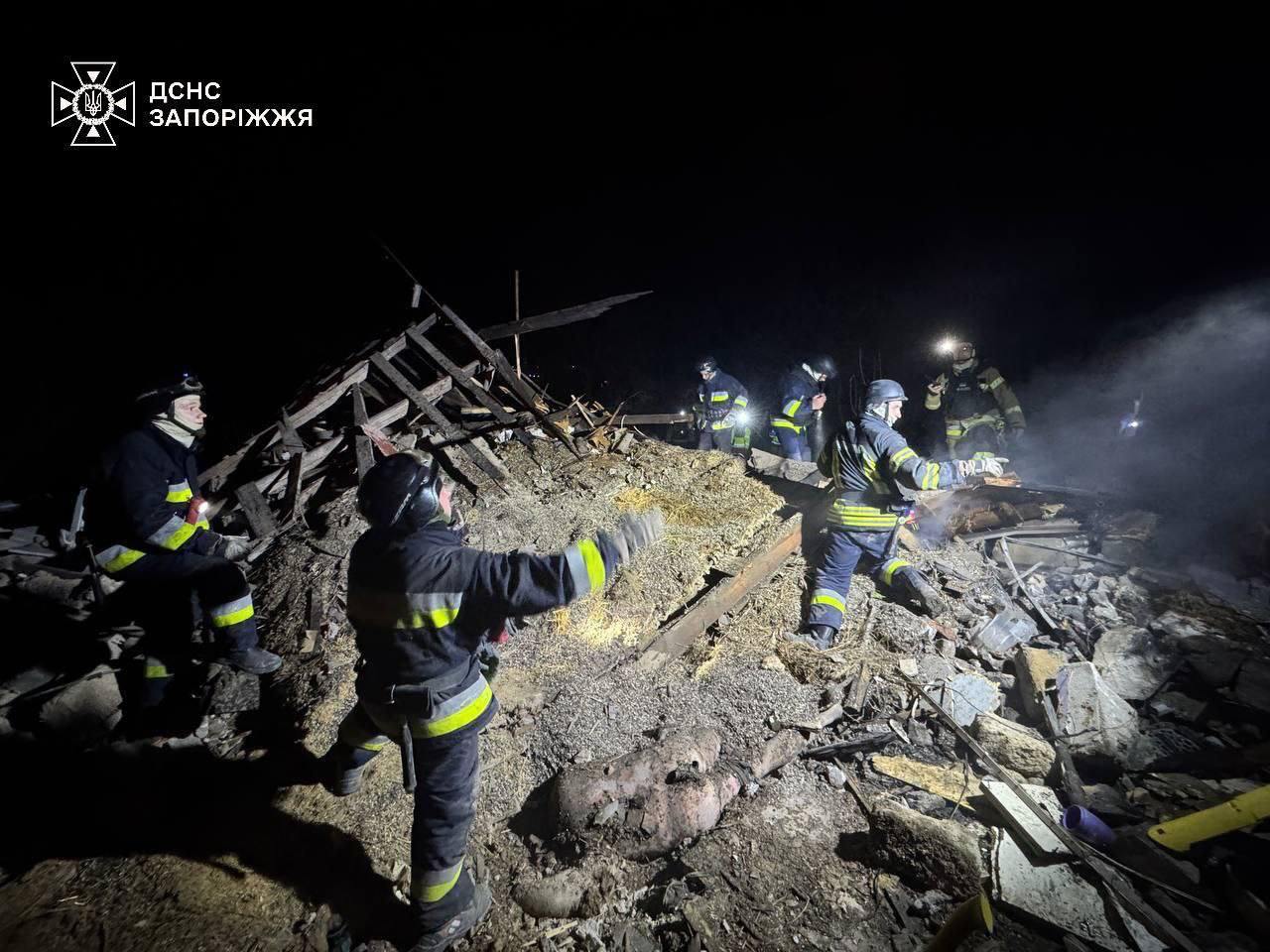As Putin and Trump Discuss a Partial Ceasefire, Russian Missiles Continue to Fall on Ukraine While Europe Prepares for a New Security Guarantor Role
Summary of the Day – March 21, 2025
Diplomatic activity between the White House and the Kremlin provides a ghostly hope for peace, while the reality on the battlefield tells an entirely different story. Putin claimed to have ordered a halt to strikes on Ukraine’s energy infrastructure, yet overnight attacks continued with renewed force – over 214 drones targeted Ukrainian cities. Against the backdrop of negotiations, Trump expressed the idea of “dividing up lands” as part of a future agreement, which fundamentally contradicts Kyiv’s position. Germany allocated an additional €3.3 billion in military aid, while the United Kingdom is considering deploying its fighter jets to Ukraine as part of a potential peacekeeping mission. Talks in Saudi Arabia, scheduled for March 24, are gaining decisive importance for the future of the conflict.
Kremlin’s Weaponization of Peace: Russia Misrepresents Ceasefire Terms to Undermine Negotiations
The Kremlin is deliberately mischaracterizing the status and terms of a potential ceasefire agreement to sabotage negotiations for ending the war. When a fire broke out at the Sudzha gas distribution station in Russian-occupied Kursk Oblast, Moscow immediately accused Ukrainian forces of intentionally targeting the facility to discredit Putin’s “peace initiatives.” Ukraine’s General Staff denied the claim, stating that Russian forces had shelled the station themselves, causing the fire.
 Footage of an alleged fire at the Sudzha gas metering station in Russia’s Kursk Oblast, published. (Screenshot / ASTRA)
Footage of an alleged fire at the Sudzha gas metering station in Russia’s Kursk Oblast, published. (Screenshot / ASTRA)
“The Russians continue to produce numerous fakes and seek to mislead the international community,” Ukraine’s General Staff stated. “The mentioned station was repeatedly shelled by the Russians themselves.”
This incident exemplifies a broader pattern of Russian information warfare. Kremlin officials are leveraging narratives about Ukrainian strikes to justify rejecting peace negotiations and continuing the war. Despite Putin’s supposed order to halt energy infrastructure attacks, Russian drones continue to rain down on Ukrainian cities, including a major strike on Odesa during Czech President Petr Pavel’s visit that injured three people.
 Russia launched a mass drone strike on Odesa during a visit to the city by Czech President Petr Pavel. (Oleksii Kuleba / Facebook)
Russia launched a mass drone strike on Odesa during a visit to the city by Czech President Petr Pavel. (Oleksii Kuleba / Facebook)
Trump’s Land Division Proposal: A Stark Departure from Ukraine’s Red Lines
In a significant and controversial development, U.S. President Donald Trump revealed that ongoing negotiations include provisions for “dividing up lands” as part of a future peace agreement.
“Pretty soon, we’ll have a full ceasefire, and then we’re going to have a contract,” Trump said during a press briefing, adding that the future deal includes “dividing up the lands.”
Trump’s statement represents a dramatic shift in approach that directly contradicts Ukraine’s consistently stated position. President Volodymyr Zelensky has repeatedly rejected recognizing Russian occupation of Ukrainian territories in peace talks, calling it a “red line” that Kyiv will not cross. Ukraine’s Constitution explicitly states that the “territory of Ukraine within its present border is indivisible and inviolable.”
When asked about imposing new sanctions on Russia as it continues to attack Ukraine, Trump dodged the question, saying simply, “Well, they’re fighting against each other.”
The Riyadh Shuttle: U.S. Plans Separate Talks with Ukraine and Russia
U.S. officials will conduct “shuttle diplomacy” between Ukrainian and Russian delegations in Riyadh, Saudi Arabia, on March 24. Special Envoy for Ukraine Keith Kellogg described the approach as moving “between rooms” to facilitate indirect negotiations.
Ukrainian Foreign Ministry spokesman Heorhii Tykhyi clarified that Ukrainian and Russian delegations will not interact directly during the talks. “This is their choice. But we are preparing for the talks in Saudi Arabia as bilateral Ukrainian-American ones,” Tykhyi said. He emphasized that Ukraine is preparing for a technical, not political, round of negotiations.
CBS Senior Correspondent Jennifer Jacobs reported that U.S. technical teams intend to meet with the Ukrainian delegation on March 23, the Russian delegation on March 24, and may meet with the Ukrainian delegation again later that day if significant progress occurs.
The Russian delegation will be led by career diplomat Grigory Karasin and senior FSB official Sergei Beseda, individuals Kremlin spokesman Dmitry Peskov described as “experienced negotiators with a wealth of experience in this kind of work.” Neither are seen as high-ranking decision makers, suggesting limited Russian investment in the process.
Europe Steps Up: Coalition of the Willing Takes Shape as America Retreats
As concerns grow about U.S. commitment to Ukraine, European nations are intensifying efforts to fill the security vacuum. The UK will host three more days of military planning sessions next week to prepare high-level plans for mobilizing a European-led “coalition of the willing” in the event of a ceasefire.
British Prime Minister Keir Starmer announced that these sessions would form “military sub-planning groups, across land, sea, air, regeneration and reconstruction.” Over 30 countries have already expressed willingness to participate in the coalition, which has moved into what Starmer calls an “operational phase.”
In a significant development, The Telegraph reported that British military leaders have discussed deploying Royal Air Force fighter jets to Ukraine as part of the potential security arrangement. The RAF could deploy either Typhoon or U.S.-made F-35 fighter jets to conduct air patrols.
Lithuanian President Gitanas Nauseda announced that his country is prepared to send troops as part of the post-ceasefire mission. “My country is ready to provide the necessary support,” Nauseda told Bloomberg Television. “We are talking about very concrete numbers of our troops, but there should be a commitment from all countries in this coalition to provide this support.”
Alternative Peacekeeping Models: Macron Explores UN-Led Operation
French President Emmanuel Macron is exploring the possibility of establishing a United Nations-led peacekeeping mission to protect Ukraine following a potential peace agreement, according to The Telegraph. Macron reportedly raised the idea during a European Council summit, where he discussed the concept with UN Secretary-General Antonio Guterres.
This approach would align with traditional UN peacekeeping operations, which typically involve deploying multinational forces to maintain security, protect civilians, and facilitate humanitarian aid in conflict zones. However, any UN peacekeeping force would require approval from the UN Security Council, where Russia holds veto power, making the viability of such a mission questionable.
Germany Opens Its Wallet: €3.3 Billion in Fresh Aid for Ukraine
In a significant boost to Ukraine’s defense capabilities, Germany approved an additional €3.3 billion in military aid. The parliament’s budget committee gave the green light for the funds, which had been on hold for months amid political discord in outgoing Chancellor Olaf Scholz’s coalition government.
“It’s a strong signal to Ukraine, a signal that is absolutely necessary for peace and security in Europe,” said Greens MP Britta Hasselmann.
The new funding comes on top of €4 billion already planned in Germany’s budget for 2025, with a further €8.3 billion earmarked for 2026 to 2029. Government spokesman Steffen Hebestreit confirmed that the package would include German-made Iris-T air defense systems that would be delivered over the next two years.
Outgoing Chancellor Scholz emphasized Germany’s continued support, stating: Ukraine “can rely on us and we will never leave it on its own. It will also need a strong army in times of peace, and it must not be put in danger by any peace agreement.”
Putin’s North Korean Gambit: Russia Strengthens Ties Despite Western Warnings
Russia continues to deepen its relationship with North Korea, ignoring growing international concerns. Russian Security Council Secretary Sergei Shoigu traveled to North Korea on March 21 and met with North Korean dictator Kim Jong Un, likely to discuss bilateral relations.
U.S. State Department Spokesperson Tammy Bruce condemned North Korea’s involvement in Russia’s war against Ukraine, noting that Pyongyang’s support “fuels and exacerbates the war in Ukraine.” Ukrainian and Western officials have repeatedly warned that North Korean involvement in Russia’s offensive operations enhances North Korea’s military capabilities, posing potential security risks in the Asia-Pacific region.
Simultaneously, Russian officials continue building ties with China. FSB Head Alexander Bortnikov met with Chinese Security Minister Wang Xiaohong in Beijing on March 21 to discuss bilateral relations. Wang noted China’s readiness to support multi-level meetings between Russian and Chinese law enforcement agencies and security services.
The Phantom Drone Armada: Russian Night Attacks Continue Despite Ceasefire Claims
The Russian military launched a massive overnight drone strike against Ukraine, deploying 214 drones from Kursk, Bryansk, Rostov Oblast, Krasnodar Krai, and occupied Crimea. Ukrainian forces downed 114 Shahed-type drones, while 81 drones were “lost,” likely due to electronic warfare interference.
Russian drones struck critical infrastructure in Khmelnytskyi, Sumy, and Kyiv oblasts, as well as port facilities in Odesa. The attack on Odesa came during Czech President Petr Pavel’s visit to the city, in what appears to be a deliberate message regarding Moscow’s true intentions.
 А massive Russian drone attack on Odesa Oblast, injured three people, including minors, and damaged civilian infrastructure. (State Emergency Service / Telegram)
А massive Russian drone attack on Odesa Oblast, injured three people, including minors, and damaged civilian infrastructure. (State Emergency Service / Telegram)
“It was during our meeting that Russia launched three groups of Shahed on the city. The entire civilized world should see Russia’s crimes against Ukraine,” said Ukrainian Deputy Prime Minister Oleksii Kuleba, who was meeting with Pavel at the time.
Ukraine’s POW Success: Over 4,000 Defenders Return from Russian Captivity
Ukraine has returned 4,306 prisoners of war from Russian captivity since the start of the full-scale invasion, President Volodymyr Zelensky announced. In 2024 alone, Ukraine managed to bring 1,358 people home from Russian detention.
“Now, when we talk to the American side and our other partners about how to end the war, we talk about the release of prisoners as one of the first steps,” Zelensky said.
Most recently, Ukraine brought home 197 Ukrainian soldiers. Of these, 175 were returned as part of a one-for-one exchange with Russia, while another 22 Ukrainian service members were returned through separate negotiations. The swap was facilitated by the UAE with involvement from Donald Trump and Vladimir Putin.
Shadow Fleet Seized: Germany Confiscates Russian Oil Tanker
The German government has confiscated a tanker linked to Russia’s “shadow fleet,” according to Der Spiegel. After a confiscation order from the General Customs Directorate, Germany acquired ownership of the Panamanian-flagged vessel Eventin and its cargo — approximately 100,000 tons of crude oil worth over €40 million.
The shadow fleet refers to aging and largely uninsured oil tankers that Russia uses to transport oil above the $60 per barrel price cap imposed by Western nations in December 2022. The Eventin had been sailing from the Russian port of Ust-Luga through the Baltic Sea to Egypt before being stranded off the German coast since mid-January.
By seizing the tanker, Germany aims to signal to Russia that it will not tolerate Russian oil shipments through the Baltic Sea that violate sanctions. In recent months, shadow fleet vessels have been suspected of sabotage operations in the Baltic Sea, causing major damage to undersea cables.
Deadly Strike on Zaporizhzhia: Russian Attack Kills Three, Injures Twelve
Russia attacked the city of Zaporizhzhia on the evening of March 21, killing three people, including a 20-year-old woman, regional governor Ivan Fedorov reported. At least 12 people were injured in the strike, which damaged several apartment buildings. Multiple high-rises and homes caught fire following the attack.
 First responders work at the site of Russian strike on the city of Zaporizhzhia. (State Emergency Service)
First responders work at the site of Russian strike on the city of Zaporizhzhia. (State Emergency Service)
 A wounded dog receives medical treatment following a Russian shelling on a settlement in Zaporizhzhia, Ukraine Pavel. Rescue teams provided aid to injured civilians and animals affected by the attack involving a guided aerial bomb. (Zaporizhzhia Regional Military Administration / Anadolu via Getty Images)
A wounded dog receives medical treatment following a Russian shelling on a settlement in Zaporizhzhia, Ukraine Pavel. Rescue teams provided aid to injured civilians and animals affected by the attack involving a guided aerial bomb. (Zaporizhzhia Regional Military Administration / Anadolu via Getty Images)
This marks the second attack on Zaporizhzhia in a 24-hour period. Russia targeted the outskirts of the city with guided aerial bombs on the evening of March 20, injuring six people, including a four-year-old boy.
Zaporizhzhia, home to approximately 710,000 residents before Russia’s full-scale invasion, has frequently been targeted by Russian forces. The oblast is also home to Europe’s largest nuclear power plant, which has been under Russian occupation since 2022 and has featured prominently in recent peace discussions.
Looking Forward: Peace Remains Distant Despite Diplomatic Momentum
Despite intensifying diplomatic efforts and ceasefire discussions, the gap between rhetoric and reality remains vast. The contradiction between Putin’s claimed order to halt energy infrastructure strikes and the continuing drone attacks underscores the challenges of reaching any lasting agreement.
As technical teams prepare to meet in Riyadh and Trump expresses optimism about a ceasefire, the coming days will be critical in determining whether diplomatic initiatives can translate into meaningful progress on the ground. For now, the phantom ceasefire remains just that—a shadow of what could be, while the grim reality of war continues across Ukraine.
European nations, recognizing the potential limitations of American commitment, are taking unprecedented steps to prepare for a more prominent security role. Whether through a coalition of the willing, a UN peacekeeping mission, or bilateral support, Europe appears determined to ensure Ukraine’s security regardless of the outcome of U.S.-Russia talks.
